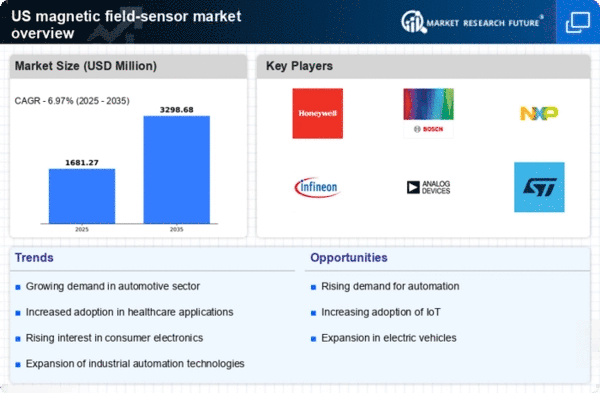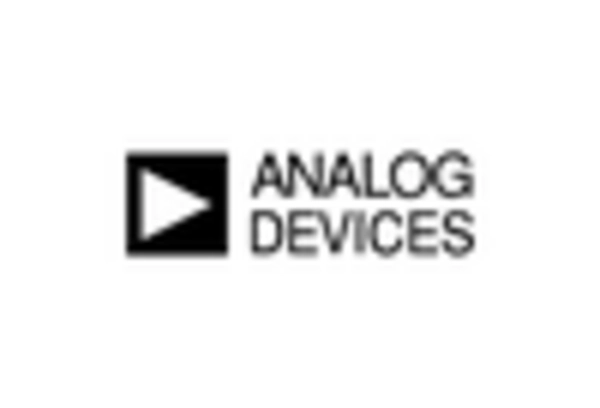Growing Demand for Consumer Electronics
The magnetic field-sensor market is significantly influenced by the growing demand for consumer electronics. As devices such as smartphones, tablets, and wearables become more prevalent, the need for advanced sensors to enhance user experience is rising. Magnetic sensors are increasingly used in applications like compass functionality, motion detection, and gaming. The consumer electronics sector is expected to account for a substantial share of the market, with projections indicating a growth rate of around 10% annually. This trend suggests that manufacturers are prioritizing the integration of magnetic field sensors to meet consumer expectations for innovative features. Consequently, the magnetic field-sensor market is poised for expansion as it aligns with the evolving landscape of consumer technology.
Expansion of Renewable Energy Technologies
The magnetic field-sensor market is positively impacted by the expansion of renewable energy technologies, particularly in wind and solar energy sectors. Magnetic sensors are essential for monitoring and optimizing the performance of renewable energy systems, such as wind turbines and solar panels. As the push for sustainable energy solutions intensifies, the demand for efficient monitoring systems is expected to rise. The renewable energy market is projected to grow at a CAGR of approximately 11% over the next five years, which could lead to increased investments in magnetic field sensors. This trend suggests that the magnetic field-sensor market will likely benefit from the broader shift towards renewable energy, as these sensors play a critical role in ensuring the efficiency and reliability of energy systems.
Increased Focus on Automation and Robotics
The magnetic field-sensor market is benefiting from an increased focus on automation and robotics across various industries. As companies strive to enhance operational efficiency, the integration of magnetic sensors in automated systems is becoming more common. These sensors play a crucial role in position sensing, speed detection, and safety monitoring in robotic applications. The industrial automation sector is projected to grow significantly, with estimates suggesting a CAGR of approximately 9% over the next five years. This growth is likely to drive demand for magnetic field sensors, as they are essential for ensuring the reliability and precision of automated processes. Thus, the magnetic field-sensor market is expected to thrive in tandem with advancements in automation technologies.
Rising Adoption in Healthcare Applications
the magnetic field-sensor market is seeing increased adoption in healthcare applications., driven by the need for precise monitoring and diagnostics. Magnetic sensors are increasingly utilized in medical devices for applications such as magnetic resonance imaging (MRI) and patient monitoring systems. The healthcare sector is focusing on improving patient outcomes through advanced technology, which includes the integration of magnetic sensors for enhanced data accuracy. The market for healthcare-related magnetic sensors is anticipated to grow at a rate of around 7% annually, reflecting the increasing reliance on technology in medical settings. This trend indicates that the magnetic field-sensor market is likely to expand as healthcare providers seek innovative solutions to improve diagnostic capabilities.
Technological Advancements in Sensor Design
The magnetic field-sensor market is experiencing a surge in technological advancements that enhance sensor design and functionality. Innovations in materials and fabrication techniques are leading to the development of more sensitive and accurate sensors. For instance, the introduction of MEMS (Micro-Electro-Mechanical Systems) technology has enabled the production of smaller, more efficient sensors that can be integrated into various applications. This trend is particularly evident in the automotive sector, where advanced magnetic sensors are utilized for navigation and safety systems. The market is projected to grow at a CAGR of approximately 8% over the next five years, driven by these advancements. As a result, the magnetic field-sensor market is likely to see increased adoption across multiple industries, including consumer electronics and industrial automation.














